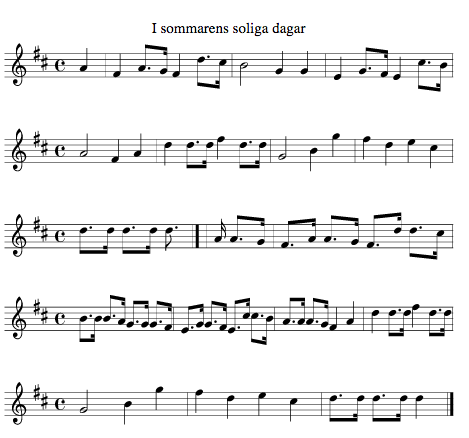It was a festive occasion, the annual meeting of the Nordiska Psalmodikonförbundet, a society of people who play a folk zither called the psalmodikon, and the singing was followed by a jam session involving two nyckelharpor (Swedish keyed fiddles), a harmonica, a couple of ukes and -- something I'd never seen before and couldn't have imagined -- a psalmodikon playing backup chords.
But the singing was what stood out to a visitor from North America. About a dozen of us were gathered around the table, and all but two of us joined in on song after song -- they knew all the words, too, and several sang harmony parts -- and it sounded like fun. It was, too, as I'd catch a melody and softly join in singing "ah" on the second or third verse, nice and soft so I wouldn't ruin the harmonies.
After a while they asked us, well, what do you sing at parties in America?
Welp, we answered, uh ...
Long silence. Debi and I exchanged halfway panic-stricken glances. What do we sing?
Well, we don't sing all that much, we said. We don't learn as many songs in school as Swedes do, and we don't sing them much after we get out of elementary school.
But there are a few, we added, searching our memories. We used to sing one called "Ninety-nine Bottles of Beer on the Wall" on the school bus. I'd sing it in high school back in Tennessee, on the way to "away" ball games, and it drove our chaperones crazy.
Oh, the Swedes replied. "Ninety-nine Bottles of Beer on the Wall." That sounds rather nice. Will you sing it for us?
So Debi and I joined in:
Ninety-nine bottles of beer on the wall,
Ninety-nine bottles of beer.
Take one down,
Pass it around,
And ninety-eight bottles of beer on the wall.
What else could we do?
We sang the next verse, and the Swedes joined in:
Ninety-eight bottles of beer on the wall,
Ninety-nine bottles of beer.
Take one down,
Pass it around,
And ninety-seven bottles of beer on the wall.
And so it went, everyone joining in. I won't claim it was great music, and I wouldn't be surprised to learn the Swedes were humoring their North American guests who don't sing in public after they get out of school and aren't very good at it when we try, but we got down as far as 94 or 95 bottles of beer on the wall.
In Sweden, it's different. I've been told, and we heard it again that night at Östervåla, more Swedes per capita take part in church or community choirs than in any other country worldwide. Behind that statistic lies a simple fact -- they sing in groups because it's fun, and they've learned it from childhood.
It has other benefits as well, according to a study by the Sahlgrenska Academy at Gothenburg (Göteborg) University, ranging from cardiac to mental well-being.
Certainly it was a lot of fun at Östervåla. I wish we sang at social gatherings in America.
At any rate, perhaps inspired by our bravura performance of "Ninety-nine Bottles of Beer on the Wall," the Psalmodikonförbundet folks launched into what sounded like a chest-thumping march that is actually a school song called I sommarens soliga daga (in summer's sunny days). Summers throughout Scandinavia are lovely -- and brief -- and they are celebrated in several favorite Swedish songs. A lot of Swedish folk tunes are in minor modes that sound dark to American ears, but the summer tune are upbeat, peppy and really quite nice.
At one time, the Swedish education authorities decreed that every graduate of the Swedish school system ought to be able to join in a few songs, and I sommarens soliga daga was one of them. Clearly the school authorities were onto a good idea.
At any rate, another bravura performance followed around the table at Östervåla.
I liked the song immediately, and made a note of its title. When I got home, I looked it up -- even transposed it from B-flat to D and put it on a "good intentions" playlist I keep at home -- the ever-growing collection of tunes I want to learn on the dulcimer someday, when and if I ever follow through on my good intentions.
I sommarens soliga daga
https://sv.wikipedia.org/wiki/I_sommarens_soliga_dagar has this: I sommarens soliga dagar är en svensk sång i tvåtakt med text av Gustaf Johansson. Melodin är enligt Sjung, svenska folk en ”gammal marschmelodi".
Sången ingick från 1943 bland de stamsånger som var obligatoriska i skolundervisningen men ströks från listan redan 1949.
- Notes (in B-flat) http://abcnotation.com/tunePage?a=trillian.mit.edu/~jc/music/abc/mirror/musicaviva.com/sweden/i-sommarens-soliga/0000.
- Lyrics (with chords in A) http://www.svenskaackord.com/artists/ovrigt/tracks/i-sommarens-soliga-dagar-7446.
"Allsång på Skansen" (06 August, 2013). Wikipedia, Allsång på Skansen (Sing-along at Skansen) is a Swedish show held at Skansen, Stockholm, every summer on Tuesdays between 8pm and 9pm. The audience is supposed to sing-along with musical guests to well-known Swedish songs. The show started in 1935 on a small scale; about 50 people in the audience. Today about 10,000–25,500 people come to each performance.
Lill Babs: "I sommarens soliga dagar" & "Full orkan"






No comments:
Post a Comment